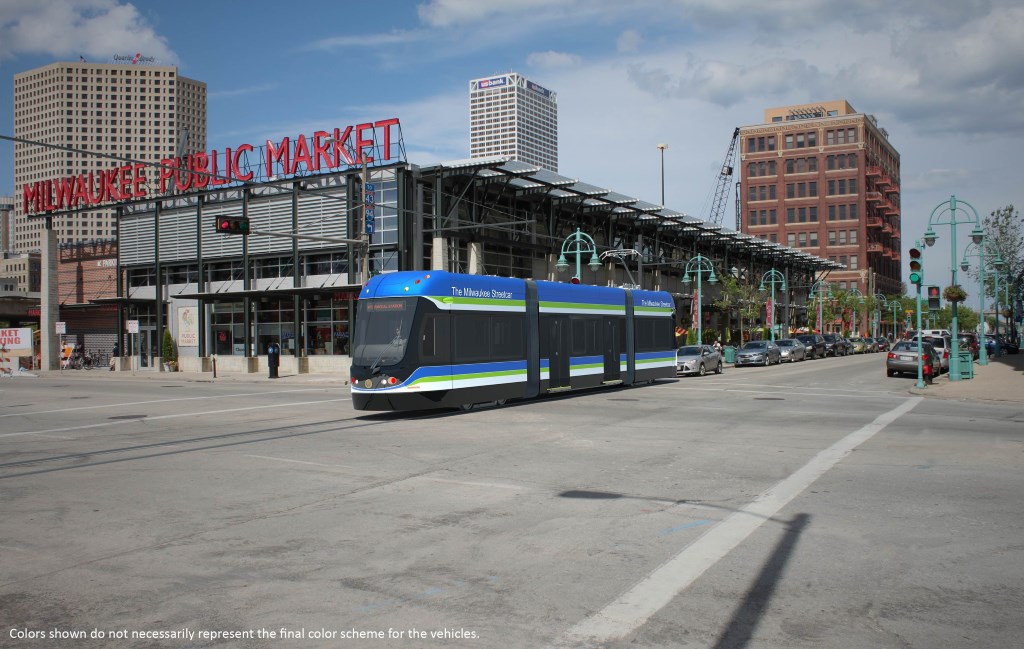County Gets Waiver on Streetcar
Still in running to operate city's streetcar, but a long shot to win.

Rendering of a Brookville streetcar in the Third Ward. Milwaukee’s streetcars will be manufactured by U.S.-based Brookville Equipment Corp.
Milwaukee County is still in the running to operate and maintain the city’s streetcar system. A letter obtained by Urban Milwaukee from a high-ranking Milwaukee County official shows the city has advanced the county’s bid to operate the system. In the letter City Engineer Jeff Polenske informs Milwaukee County Transit System Chief Administrative Officer Sandra Kellner that the county has been granted a 90-minute in-person interview with the city’s selection team on Wednesday morning. The letter also notes the city is waving the minimum requirement to be eligible for consideration.
The city waved the requirement that the county have a “minimum of five years of demonstrated streetcar or related transit service experience on similar systems in an urban environment.” While the county operates a transit system that provides 150,000 rides a day, it does not operate any rail-based vehicles.
The county’s bid on the streetcar, which we’ve covered at length, was the result of an about-face by the Milwaukee County Board of Supervisors on their previous votes on the project. On March 23rd the board overwhelmingly approved a request for the county and its transit system to submit a bid by the RFP’s April 4th deadline. The county met that tight deadline through what a number of sources indicate was a substantial, time-consuming effort.
Addressing that 100-point scale back in early March, MCTS Director Dan Boehm told the Milwaukee County board’s Transportation, Public Works and Transit Committee “the deck’s pretty stacked against us.” Fifty percent of the RFP score is based on “experience and qualifications” and “past performance” — of which the county has none outside of the long-term operation of its own bus system. The issue of cost is also a substantial scoring figure, representing 30 percent of the bid score and there the county is also handicapped.
That’s because the streetcar operator, though paid by the city, would do so in an at-risk position, meaning that if the county were to bid too low, it could lose money and violate a state law which forbids the county from spending any money on a streetcar. To avoid this scenario, Boehm previously told the committee that they would have to propose a fairly high cost, which would reduce their likelihood of winning the contract.
Losing the contract doesn’t mean the county will never have a chance to bid again. The first operator contract is being awarded for a minimum of six years, three months with a five-year renewal option held by the city.
Also, other operators still could end up collaborating with the county. In his March testimony on the matter, Boehm noted the RFP excludes fare collection systems and customer service, two areas which he said are great opportunities for Milwaukee County to collaborate with the city outside the RFP, given the county’s M-Card fare system and transit system customer service center.
Who Else is Bidding?
At least one additional entity was granted an interview with the city to discuss the matter. Sources close to the matter also confirm that at least one bidder has discussed a partnership with MCTS. So should Milwaukee County lose out, as seems likely, at least one for-profit firm bidding for the contract would still include the county in their operation and management plan.
The city issued the request for proposals on February 17th and anticipates selecting an organization to operate and maintain the streetcar before the end of the summer.
Officials from the city declined to comment on the matter.
Public operation on the initial route connecting the Milwaukee Intermodal Station and Westown with the Historic Third Ward, East Town and the Lower East Side is scheduled to begin in the fourth quarter of 2018 following route testing. The lakefront line extension is expected to begin operating in the fourth quarter of 2019.
More Information
For more information on project details, how the operator will be selected, what the vehicles will be like, and possible extensions, see our extensive past coverage.
- Streetcar Rails Being Welded – Jeramey Jannene – April 7th, 2017
- City Won’t Delay Streetcar for County – Jeramey Jannene – March 28th, 2017
- County Okays Streetcar Bid – Jeramey Jannene – March 23rd, 2017
- Streetcar Track Steel Has Arrived – Jeramey Jannene – March 16th, 2017
- Should County Operate Streetcar? – Jeramey Jannene – March 8th, 2017
- Streetcar Track Construction Starts in April – Jeramey Jannene – February 17th, 2017
- Should County Operate Streetcar – Jeramey Jannene – March 8th, 2017
- The Milwaukee Streetcar is Hiring – Jeramey Jannene – January 20th, 2017
- Streetcar Project Receives Federal Grant – Jeramey Jannene – October 12th, 2016
- Council Okays Streetcar to Bucks Arena – Jeramey Jannene – July 6th, 2016
- $6.5 Million in Streetcar Savings – Jeramey Jannene – February 26th, 2016
- Donovan Lies About Streetcar Suit – Jeramey Jannene – February 15th, 2016
- BID Sells Streetcar-Related Development – Jeramey Jannene – January 15th, 2016
- Pennsylvania Company Wins Streetcar Contract – Jeramey Jannene – November 13th, 2015
- City Accepts $14 Million Federal Streetcar Grant – Michael Horne – October 29th, 2015
- Anti-Streetcar Petition Dies – Bruce Murphy – August 28th, 2015
- Scott Walker Aids Milwaukee Streetcar – Jeramey Jannene – July 13th, 2015
- Streetcar Construction Starts in October – Jeramey Jannene – July 10th, 2015
- The Strange Politics of Anti-Streetcar-ites – Bruce Murphy – June 18th, 2015
- Anti-Streetcar Petition Drive Fails – Bruce Murphy – March 5th, 2015
- Streetcar Signing Is Quite a Celebration – Michael Horne – February 13th, 2015
- Milwaukee Streetcar Approved – Jeramey Jannene – February 10th, 2015
- Who’s Lobbying for the Streetcar – Bruce Murphy – February 5th, 2015
- Will Streetcar Help the Inner City? – Bruce Thompson – February 4th, 2015
- City Attorney Says Streetcar Petitions Might be Moot – Bruce Murphy – January 30th, 2015
- Millennials And The Streetcar – Bruce Thompson – January 27th, 2015
- Streetcar Responses Show Wide Support – Jeramey Jannene – January 22nd, 2015
- Streetcar Approved, but Held – Jeramey Jannene – January 21st, 2015
- Koch-Funded Group Backs Anti-Streetcar Drive – Bruce Murphy – January 20th, 2015
- Streetcar Backers Say They Have the Votes – Jeramey Jannene – January 20th, 2015
- Who is Funding the Anti-Streetcar Effort? – Bruce Murphy – January 20th, 2015
- Will Anti-Streetcar Referendum Succeed? – Bruce Murphy – January 9th, 2015
- The Story Behind the Streetcar Referendum – Michael Horne and Bruce Murphy – January 8th, 2015
- Council Delays Streetcar Until January – Jeramey Jannene – December 16th, 2014
- Committee Takes No Action on Streetcar – Jeramey Jannene – December 10th, 2014
- Committee Approves Milwaukee Streetcar – Jeramey Jannene – December 9th, 2014
- RACM Approves Tax Funding for Streetcar – Michael Horne – December 8th, 2014
- How to Sell the Streetcar – Michael Horne – November 28th, 2014
- Next Stops for the Streetcar – Michael Horne – November 24th, 2014
- Barrett Moving Forward with Streetcar – Jeramey Jannene – November 18th, 2014
- Who Will Be Streetcar Operator – Michael Horne – May 8th, 2014
- A Streetcar Named Cooperation? – Dave Reid – April 27th, 2014
- How a Streetcar Spurs Development – Angie Schmitt – November 3rd, 2013
- Streetcar Social – Michael Horne – September 12th, 2013
- Mayor Says Streetcar is a “Trojan Horse” – Michael Horne – April 17th, 2013
- Whoops, We Changed Our Mind – Dave Reid – September 27th, 2012
- Battle of the Bobs: Donovan vs Bauman Streetcar Press Conference – Jeramey Jannene – May 18th, 2012
- Important Hoan Bridge and Milwaukee Streetcar Meetings This Week – Dave Reid – November 14th, 2011
- Milwaukee Streetcar Passes Common Council – Jeramey Jannene – July 26th, 2011
- Keep the Milwaukee Streetcar Moving Forward – Jeramey Jannene – July 8th, 2011
- Milwaukee Streetcar at Apex – Jeramey Jannene – June 16th, 2011
- Milwaukee Streetcar Takes Key Step Forward – Jeramey Jannene – May 6th, 2010
- Milwaukee Streetcar Meeting This Thursday – Jeramey Jannene – October 5th, 2009
- Milwaukee Streetcar Routes Unveiled by Mayor Barrett – Jeramey Jannene – September 21st, 2009
- Milwaukee Streetcar Round-Up – Jeramey Jannene – April 19th, 2009
- Vote for your Favorite Milwaukee Streetcar Route – Jeramey Jannene – March 25th, 2009
- Design Your Own Streetcar Route – Jeramey Jannene – March 23rd, 2009
- Streetcars Coming to Milwaukee – Dave Reid – March 14th, 2009
More about the Milwaukee Streetcar
For more project details, including the project timeline, financing, route and possible extensions, see our extensive past coverage.
- FTA Tells Milwaukee to Crack Down on Fare Evasion — Even Where Fares Don’t Exist - Graham Kilmer - Dec 12th, 2025
- Alderman, State Allies Seek Federal Help to Kill the Streetcar - Jeramey Jannene - Oct 28th, 2025
- Streetcar Service Suspended Following Truck Crash - Jeramey Jannene - Oct 21st, 2025
- One Alderman’s Quest To Defund The Streetcar - Jeramey Jannene - Oct 18th, 2025
- Another Streetcar Collision - Jeramey Jannene - Jun 27th, 2025
- Streetcar Hit By Apparent Red Light Runner - Jeramey Jannene - Jun 16th, 2025
- Streetcar Will Run On Consolidated Route During Summerfest - Jeramey Jannene - Jun 11th, 2025
- City Hall: Milwaukee Must Replace Failing Streetcar Switches - Jeramey Jannene - Feb 24th, 2025
- Streetcar Confronts Limited Funding, Operations Challenges - Evan Casey - Jan 22nd, 2025
- Council Kills Streetcar’s ‘Festivals Line’ - Jeramey Jannene - Jul 31st, 2024
Read more about Milwaukee Streetcar here
Eyes on Milwaukee
-
Church, Cupid Partner On Affordable Housing
 Dec 4th, 2023 by Jeramey Jannene
Dec 4th, 2023 by Jeramey Jannene
-
Downtown Building Sells For Nearly Twice Its Assessed Value
 Nov 12th, 2023 by Jeramey Jannene
Nov 12th, 2023 by Jeramey Jannene
-
Immigration Office Moving To 310W Building
 Oct 25th, 2023 by Jeramey Jannene
Oct 25th, 2023 by Jeramey Jannene






















No… please… PLEASE no…
Operating a motor bus on city streets requires training and development of skills that far surpass what is needed by the average small vehicle operator. I would expect this skilled work force of the county bus system could very easily master the skills needed for streetcar operation. Operating streetcars may be less complex than buses– not much steering or lane changes. Let’s favor local operators instead of bringing in out-of-state operators.
Skill in driving a bus or operating a streetcar is not the question. The dysfunctional county government, the transit union forcing ridiculous wages and work rules, and the all around poor management and expense of MCTS is the issue. I’m sure the union would love to have more 2 hours shifts that pay 4-8 hours of overtime… but I’d just assume be able to hire part time workers for those types of situations.
NO to the county managing the streetcar.
AG,
Per President Reagan, where “free unions and collective bargaining are forbidden, freedom is lost.”
These are the values inspiring those brave workers in Poland, the values that have inspired other dissidents under communist domination, who have been willing to go into the gulag and suffer the torture of imprisonment, because of their dissidence. They remind us that where free unions and collective bargaining are forbidden, freedom is lost… They remind us that freedom is never more than one generation away from extinction. You and I must protect and preserve freedom here, or it will not be passed on to our children and it will disappear everywhere in the world. Today, the workers in Poland are showing a new generation how high is the price of freedom, but also how much, it is worth that price. I want more than anything I’ve ever wanted, to have an administration that will through its actions, at home and in the international arena, let millions of people know, that Miss Liberty, still lifts her lamp beside the golden door.
http://bloggingblue.com/2015/03/ronald-reagan-collective-bargaining-freedom-video/#comment-146867
His video, in front of the Statue of Liberty last about 90-seconds.
You don’t understand the paradox of thrift. If everyone saves, everyone starves.
“Without spending–there are no sales;
Without sales–there are no profits;
Without profits–there is no demand for workers;
Without demand for workers–there is no job creation;
and without job creation–there is no recovery!”
I got this via economist Pavlina Tcherneva. @ptcherneva
Why are you opposed to workers–people who do actual work–in the REAL economy, the part that makes stuff, the part that matters making a profit?
The vast majority of income in the U.S. goes to Wall Street, hedge funds, and private equity funds. They collect rent. That doesn’t create wealth, it just redistributes it up to the elites–who don’t spend enough to offset wealth inequality. We need consumer spending to drive the economy. That’s why tax cuts for the elites don’t work. They don’t spend it. We need tax cuts for the 99%.
Democratic capitalism depends on wealth created by improvements in productivity. If they don’t get a share of the profits, why should workers participate?
Physicians, attorneys, dentists, engineers, those are unions. They use credentialing to bargain collectively, to limit the supply of their labor. That’s what puts a floor underneath their wages.
John Casper, unions can also gain too much influence toward which they overstep their value and impinge on others. That is what has happened with the transit union in Milwaukee.
Unions in certain areas, like the trades, are offset by non-union shops. Without that counter balance, such as in the public sector, there is no check on the system and things get out of whack. There’s no reason to pay someone half a days work or more, just because they worked for an hour or two extra when you can hire part time workers to do the same thing. (that is only the biggest of my issues with the latest MCTS contract).
AG,
Where does any union have “too much influence?”
Have you heard of Amazon, Facebook, Google, Apple, ….? Do you understand what a monopoly is? Do you understand what an oligopoly is?
Do you understand”shared prosperity?”
The transit union has lots of “checks” on it. Start with cars, taxis, and bikes.
Unions lock in labor costs. That allows corporations to compete on some other basis besides how much they can loot out of their workers.
Wealth concentration at the top is the problem that has no “check.”
At the beginning of the 20th century, 99% of Americans worked on farms and ranches. Now about 1% of the population grows all that food. Where are the new frontiers of wealth generation that democratic capitalism would be opening, if not for the oligarchs?
AG,
Milwaukee County Transit System operators earn about $50K a year. If your income is less than that, consider a career change and become a MCTS employee.
If your income is more than that, what is your complaint?
More than likely your income and benefits resulted directly or indirectly from union negotiations– even if you were not a union member. My experience as a “professional/exempt/at-will/non-union” employee is that I received improved benefits AFTER the labor force union negotiated for improved benefits. Yes, there are abuses from extremes– from both unions and management.
John Casper, the irony is that the transit union IS a monopoly for the public transportation workforce. You’re right, cars, taxis, bikes, etc are a “check” and look what happened… record low ridership because people don’t want to pay the fares to cover high labor costs OR the routes were eliminated. The transit union doesn’t support shared prosperity, it supports only the senior union members at the cost of everyone else.
This has nothing to do with the “1%” or concentration of wealth… this is one group of working class citizens taking advantage of all the other working class citizens. If the union would have agreed to allow a few more part time drivers for MCTS then we wouldn’t have to ask everyone in MKE county to pay a $60 wheel tax and we wouldn’t be reviewing ending more routes. Do you think the 1%’ers care about a wheel tax? That tax only hurts middle and low income residents.
Your last paragraph is a whole different discussion…
People stopped riding the bus to protest high labor costs?! Now I have coffee all over my keyboard. I’d love to see hard evidence to support that claim. AG your blind hatred of the union clouds your thinking. Your criticism isn’t thoughtful or well-reasoned. It’s just anti-union rhetoric that sounds like it was lifted straight from a GOP press release.
In all this back and forth about Unions, why are the Police & Firemen Unions never discussed? Yes, they are protected by politicians but are they any “cleaner” than the other Unions that some people are always complaining about?
No they certainly aren’t any cleaner Old77er and many have very selective and partisan outrage when it comes to which unions they bash, AG included.
Vincent, is that really how you understood that? Tell me you’re not that dense. I’ll try to dumb it down for those who need it. The declines in the last decade or two have indeed been, at least in part, influenced by the rising ticket prices.
Federal law (49 USC §5333(b)(2)(B), I believe) requires that transit workers be allowed to unionize. As long as this remains the law, transit workers will be paid very well. There is nothing the City, County or State can do about this (short of refusing all federal transit subsidies—and possibly repaying past subsidies). This is why Scott Walker exempted transit workers from Act 10.
Neither party seems to have any interest in repealing this law—Democrats because repeal would hurt unions, and Republicans because repeal would help transit.
Regardless of who runs Milwaukee’s Streetcar, its workers will surely unionize, probably with Local 998 (the same one as MCTS); federal law requires that transit workers have that option.